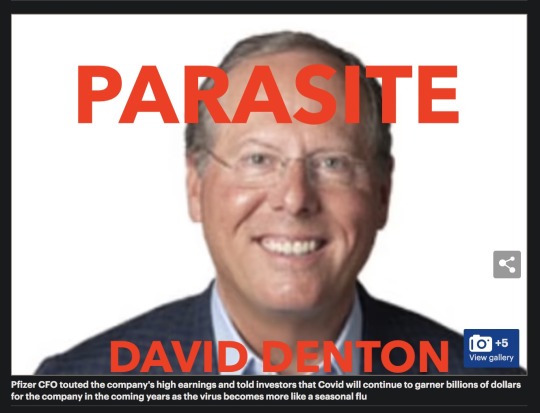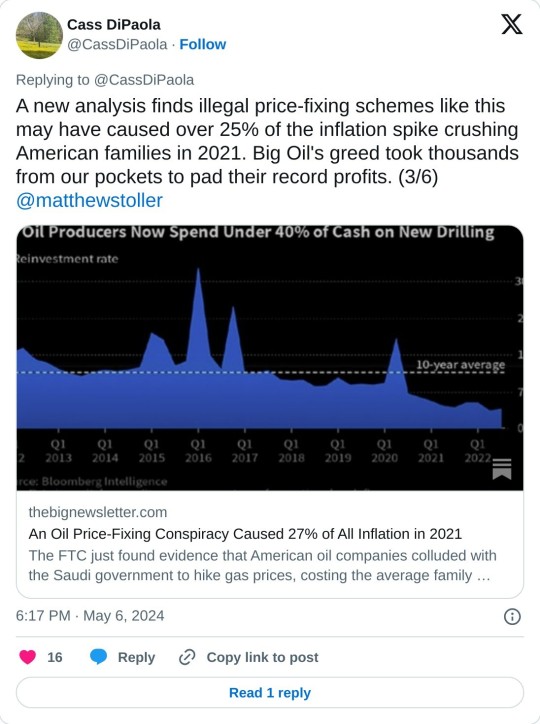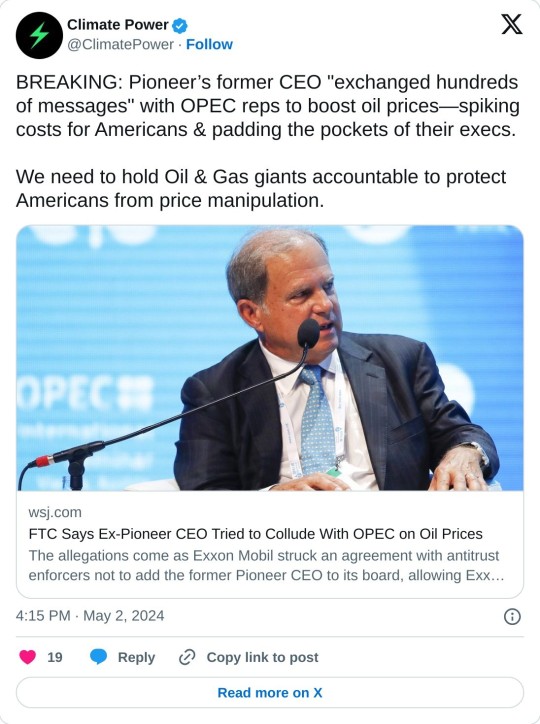#Windfall Tax
Link
Democrats don’t understand Economics 101
2 notes
·
View notes
Text
Why the North Sea Oil Industry’s Reaction to Britain’s Windfall Tax Doesn’t add up
Oil and gas firms drilling in the North Sea North Sea expressed ‘grave concerns’ about the UK’s decision to raise the Energy Profits Levy
#Climate Crisis#greed#Greedy Bastards#Punitive Tax Regime#Oil And Gas#North Sea#Windfall Tax#UK#united kingdom#Britain
0 notes
Link
Bumper profits at BP have been labelled “heinous” and sparked renewed calls for a tougher windfall tax, after the oil and gas giant recorded one of its best ever starts to the year while Britons struggled to pay high energy bills.
The energy company said its underlying profits reached $5bn (£4bn) in the first three months of the year, outstripping analysts’ forecasts of $4.3bn.
It represents the second-best results for the first quarter it has notched up since 2012, when it made $4.7bn, behind last year’s $6.2bn.
BP said its results had been boosted by reduced refining costs, an “exceptional” result in its gas trading arm and a “very strong oil trading result”. Volatility in the energy markets has increased revenues in the trading divisions of oil companies.
The company said it would reward investors, buying back $1.75bn of its own shares, a slowdown on the $2.75bn bought during the previous quarter. Shares fell by 5% on Tuesday morning, making it one of the top fallers on the FTSE 100.
The results will return attention to the debate over whether oil and gas firms should face a harsher windfall tax on their profits.
#bp#energy industry#oil#oil and gas companies#business#windfall tax#bump#profits#boost#UK#news#via Energy100FM#world news
0 notes
Text
1 note
·
View note
Text
0 notes
Text

0 notes
Text
Anyone else interested in the free market debates that have come up with regards to the current bout of inflation? (Fair warning, I didn't intend for it to be this long but it turned into a bit of a SHORT RANT (TM).)
I must admit, I'm particularly interested in the windfall tax that President Biden has recently proposed levying on oil companies as well as the varying perspectives that the arguments both for and against it come from.
On the one hand there's the arguments against the windfall tax which argue that it would disrupt the free market. The basic perspective seems to be that the oil companies took risks in funding production and that that risk is now being rewarded by increased profits. If we tax that profit, under this perspective, and reduce it in such a way, then we are, thus, disincentivizing any future investment in oil production which will then restrict supply and ensure higher prices for oil and gas in the future.
On the other hand, there's the arguments for the windfall tax which seem to argue that, because the circumstances of the rise in the price of oil are not of the companies' making and, in fact, are due to the actions of enemies of the United States and the west in general in an ongoing war, then taxing the profits made due to this event will in no way affect the normal economic incentives of oil companies. Additionally, they argue that the rise in oil prices due to the conflict has hurt the vast majority of Americans and therefore it is morally imperative to tax those who are benefiting from the rise oil prices in order to soften the blow for everyone else. Essentially, the fact that high oil prices are the result of direct actions by the governments of countries such as Russia and Saudi Arabia basically invalidates the idea that the price is set by a free market at all and justifies action by our own government to correct for the actions of other governments.
What I find most interesting about these two sets of arguments is how they basically argue past each other, one arguing the general case while the other argues the specific.
You'll notice that the argument against the windfall tax doesn't address any specific circumstances or any political issues at all, it simply takes a basic view that any shift in prices for any reason is simply the circumstance of the market and that any other issues are irrelevant. The argument in favor of the windfall tax, on the other hand, focuses very specifically on the geopolitical circumstances that have led both to high prices and to high profits.
What's particularly interesting to me is how these two different perspectives go back to the kinds of arguments we've been having about free market economics in general for a long time. Back in the 70s and 80s, after Goldwater and leading into the Raegan era, conservative thought in the United States basically posited that unregulated free markets would be more efficient than the system that was then in place. They argued that this more efficient free market would produce better outcomes for all Americans. Of note is the fact that, as the vast majority of Americans have not experienced better economic outcomes in the last 40 years compared to the outcomes of the previous 40 years, the argument has stopped being practical and has simply put forward the unregulated free market as a moral imperative.
Specifically, the argument that any government intervention in the economy would negatively impact both the economy and the economic standing of all Americans no longer seems to match the evidence of the last 40 years. In fact, it's become increasingly clear that the lack of government intervention over that time has allowed those with resources to use those resources to decrease the opportunity of anyone else to challenge their position and unfairly secure their market position. As the argument that the unregulated free market would improve the lives of all Americans has become less supported by evidence those who support the unregulated free market, rather than adjust their ideas, have simply declared it to be immoral for the government to intervene in the market.
I'll be honest, I don't expect the windfall tax to pass, but the fact that we're talking about it at all and that it was proposed by the President of the United States, no less, is evidence of the fact that a major change is taking place in how we think about economics and government. The position that the government should stay out of the economy in general is losing support at a fairly rapid rate, particularly among young people, and it's pretty clear that there's a significant demand for at least some government action to address serious distortions in our economy.
For myself I find it a little unfortunate that the "pro-free-market" position is becoming so ideological rather than adapting to evidence and changing opinion. While I support a good deal more government intervention in the economy than exists today, there is also value in some aspects of free market theory and it would be unfortunate for those aspects to be wiped away by too rapid of a pendulum swing as tends to be the case when the advocates of existing policies resist needed change for too long.
In any case, if you're interested in a good summary of the various perspectives on oil prices and a windfall tax, this is a reasonable roundup.
#short rant (tm)#politics#us politics#economics#free market#free market economics#free market theory#windfall tax
0 notes
Text
If we’re talking money surprises, the ratio of windfalls to emergencies is wildly disproportionate.
#occasionally I’ll get a dividend check for a few bucks#and there’s the will they won’t they of a tax refund#but that’s it for windfalls#feels like I hemorrhage money every other paycheck#and I’d like to speak to someone about it
41 notes
·
View notes
Text
By Jessica Corbett
Common Dreams
May 7, 2024
The Groundwork Collaborative's leader also said that "the Department of Justice should criminally prosecute Scott Sheffield," the former Pioneer CEO whom the FTC blocked from joining ExxonMobil's board.
Groundwork Collaborative executive director Lindsay Owens on Tuesday responded to U.S. government allegations of fossil fuel industry price fixing with calls for federal prosecution and congressional action to return money to the American public.
"Americans have been working harder and harder to cover rising energy costs, with the understanding that supply chain snags and geopolitical forces were keeping prices high," Owens said. "Now the Federal Trade Commission has uncovered the real source behind the price at the pump: collusion."
"The Department of Justice should criminally prosecute Scott Sheffield and Congress should tax back the industry's windfall profits and issue every American a refund," she added, referring to Pioneer Natural Resources' founder and longtime CEO.
Owens' statement came after members of the Federal Trade Commission (FTC) declined to contest ExxonMobil's controversial $64.5 billion acquisition of Pioneer—which was completed Friday—but approved a consent order barring Sheffield from serving on Exxon's board of directors or as an adviser to the fossil fuel giant.
"This complaint is a wake-up call about the dangerous consolidation of Big Oil's economic and political power."
The FTC voted 3-2 to accept the order and place related documents on the record for public comment. Citing communications including in-person meetings, public statements, text messages, and WhatsApp conversations, a commission complaint accuses Sheffield of trying to collude with the representatives of the Organization of Petroleum Exporting Countries (OPEC) and OPEC+.
"Mr. Sheffield's past conduct makes it crystal clear that he should be nowhere near Exxon's boardroom. American consumers shouldn't pay unfair prices at the pump simply to pad a corporate executive's pocketbook," said Kyle Mach, deputy director of the FTC's Bureau of Competition. "The FTC will remain vigilant in its enforcement efforts to protect competition in these vital markets."
Pioneer toldFortune that the company and its founder "believe that the FTC's complaint reflects a fundamental misunderstanding of the U.S. and global oil markets and misreads the nature and intent of Mr. Sheffield's actions," but neither party would take "any steps to prevent the merger from closing."
ExxonMobil "learned of the FTC's allegations regarding Sheffield from the agency and said in a statement that they are 'entirely inconsistent with how we do business,'" according to Fortune. "Exxon has agreed to the terms of the consent decree," which also "prohibits the oil giant from appointing any Pioneer employee or director to its board for five years."
Still, since the FTC's allegations were initially reported by The Wall Street Journal last week and then confirmed with the complaint's release, demands for additional action by the U.S. Department of Justice (DOJ) and Congress have mounted.

Cassidy DiPaola, Fossil Free Media's director of communications, on Monday called the complaint "explosive" and said that Democrats "must respond with bold action to hold this rogue industry accountable," including:
Aggressive congressional and DOJ investigations into the full extent of Big Oil's price fixing;
A windfall profits tax to claw back ill-gotten gains; and
End taxpayer subsidies for oil and gas.
"But accountability is just the first step. This complaint is a wake-up call about the dangerous consolidation of Big Oil's economic and political power. We can't let them use megamergers to entrench their control and crush clean energy competition," she stressed. "Ultimately, this is about the future we choose: One where we remain at the mercy of Big Oil's greed and destruction, or one where clean, democratically controlled energy powers our communities. It's time to make the right choice."

In response to the Journal's reporting, Tyson Slocum, director of Public Citizen's Energy Program, similarly said that "Congress must immediately hold hearings on Big Oil's alleged collusion with OPEC to raise gasoline prices for Americans."
"Congress must not only investigate Pioneer's alleged role in conspiring with OPEC, but whether there existed a broader conspiracy by U.S. oil companies to collude with OPEC nations," he argued. "Big Oil must be held accountable for any conspiracy by or among American oil companies and OPEC members."
The reporting was notably published on the same day as the U.S. Senate Budget Committee's hearing about a nearly three-year investigation into fossil fuel companies and trade groups' decadeslong "campaign of deception and distraction," which has evolved from denying the planet-heating impact of their products to pretending to be part of the solution to the climate emergency.
"The joint report and documents we discovered show how, time and again, the biggest oil and gas corporations say one thing for the purposes of public consumption but do something completely different to protect their profits," Rep. Jamie Raskin (D-Md.), the ranking member on the House Oversight Committee, testified during the hearing. "Company officials will admit the terrifying reality of their business model behind closed doors but say something entirely different, false, and soothing to the public."
#groundwork collaborative#public citizen#scott sheffield#doj#ftc#big oil#oil and gas industry#fossil fuels#windfall profits tax#gas prices#price fixing
4 notes
·
View notes
Text
I’m playing the sims 3 currently and the neighborhood I’ve picked is lucky palms ✨
I think this is meant to be a cross between las vegas and palm springs but honestly I don’t know
what’s killing me about this world is how gambling is a skill. It’s gambling. unless you’re counting cards, there isn’t any skill involved here.
5 notes
·
View notes
Text
Hey guys. Wanna know something kind of funny. So I said a few days ago I was getting a paycheck from a place I was too cowardly to pick up my last paycheck from because of the way i quit, like the state sent me a letter saying its theirs in a month unless i claim it? Okay that just happened again. Like from another job. So now I'll have two paychecks coming. Like this is money I worked for and got taxed on, but it's kind of funny theyre coming all at once.
#i mean. unexpected windfall lol#its like a tax return#its literally just my money but i wasnt expecting it so its fun#plus im saving to move out again so this helps a lot
2 notes
·
View notes
Text
CEOs were paid 399 times as much as a typical worker in 2021. Their pay is growing faster than the stock market, typical workers’ pay, and even the top 0.1% of wage earners. This isn’t normal.
#leftist#unionstrong#capitalismsucks#bernie sanders#fightfor15#livingwage#raisethewage#billionaires should not exist#ceo pay#taxthebillionaires#taxtherich#windfall profit tax#justice democrats#alexandria ocasio cortez
3 notes
·
View notes
Link
Big Oil profits from high oil prices. Companies are keeping those profits for themselves instead of giving some relief to consumers.
Russia’s war of aggression in Ukraine is the excuse Big Oil gives for higher prices at the gas pump. While oil is an international commodity, it’s also true that the United States is the largest producer of oil. There’s nothing to keep Big Oil from temporarily boosting domestic production.
If all Big Oil does is screw US consumers, it’s time for a windfall profits tax to put some of those profits back in the pockets of consumers.
President Joe Biden escalated weeks of sharp warnings to energy producers on Monday by floating a so-called “windfall” tax on their corporate profits, calling out major gas companies for racking up gains from a spike in prices he attributes to Russia’s war in Ukraine.
“Record profits today are not because they’re doing something new or innovative. The profits are a windfall of war,” Biden said in brief remarks from the Roosevelt Room alongside Treasury Secretary Janet Yellen and Energy Secretary Jennifer Granholm.
[ ... ]
Biden spoke just days after several global energy giants posted a round of massive corporate profits and after several months of Biden targeting oil executives in a push to drive private sector actions to increase production and capacity, and, in turn, drive down high prices at the pump.
[ ... ]
“It’s time for these companies to stop war profiteering, meet their responsibilities in this country and give the American people a break and still do very well,” Biden added.
In the current round of corporate quarterly reports, Big Oil made over $70 billion in profits. That’s more than the GDPs of 119 countries. Exxon alone made $19.7 billion in the July through September quarter.
It’s bad enough that fossil fuels are altering the climate. Big Oil wants us to pay them more for creating the problem.
We need the twin approach of curbing the profits of Big Oil and moving more quickly to low or zero emission vehicles. We won’t see either with the GOP in charge.
#russia's invasion of ukraine#big oil#war profiteering#windfall profits#windfall profits tax#exxon#shell#price gouging#corporate greed#fossil fuels#climate change#us consumers#joe biden#election 2022#midterm elections
4 notes
·
View notes
Text
Infosys to get windfall tax refund of Rs 6,329 crore
Story continues under Commercial
Infosys Ltd, India’s second-largest software program providers supplier, is ready to obtain a tax refund of Rs 6,329 crore from the revenue tax division. Nonetheless, the corporate additionally faces a major tax legal responsibility of Rs 2,763 crore, in accordance with evaluation orders.
“The Company is in the process of evaluating the implications of these…

View On WordPress
#careers in finance major#courses in finance#courses to do in finance#credit (finance)#crore#finance#finance (industry)#finance 101#finance advice#finance bro#finance bros#finance courses#finance courses to do#finance degree#finance influencers#finance major#finance majors#finance report#finance shorts#finances#Infosys#personal finance#refund#savvy finance#skills in finance#tax#windfall#yahoo finance#yahoo finance premium
0 notes
Text
Will the ECB pause its interest-rate rises?
We started the week with the news that the US Federal Reserve was warming us up for interest-rates that will be “higher for longer” and this afternoon we will find out what Chair Powell has to say. But that theme for the Jackson Hole symposium is seeing something of a challenge this morning as the European Central Bank decides to have a go at flying its own kite.
JACKSON HOLE, Wyoming, Aug 25…
View On WordPress
#bank windfall tax#banks#business#ECB#ECB President Lagarde#economy#Euro#Finance#Germany#Interest Rates#pause#QE#Spain
0 notes
Text
In a sane world, we'd tax windfall profits (and the rich) so more of the wealth ends up in the hands of those producing it... not those who already have enough.

0 notes